人教版英语七年级下册Unit 7 It's raining!复习课件(共44张PPT)
文档属性
| 名称 | 人教版英语七年级下册Unit 7 It's raining!复习课件(共44张PPT) | 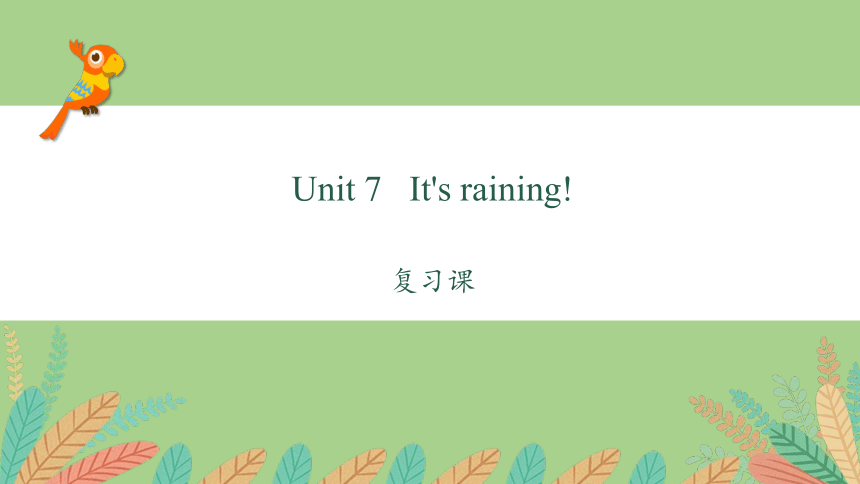 | |
| 格式 | zip | ||
| 文件大小 | 1.8MB | ||
| 资源类型 | 教案 | ||
| 版本资源 | 人教新目标(Go for it)版 | ||
| 科目 | 英语 | ||
| 更新时间 | 2021-06-22 11:26:45 | ||
图片预览

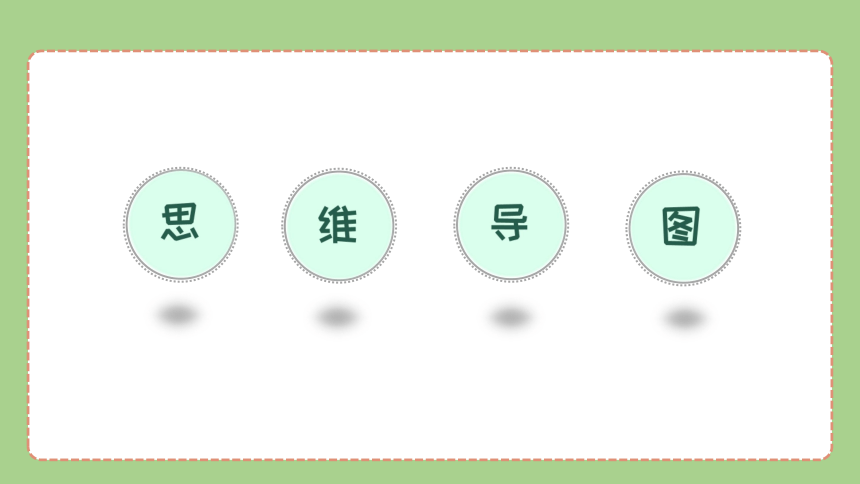
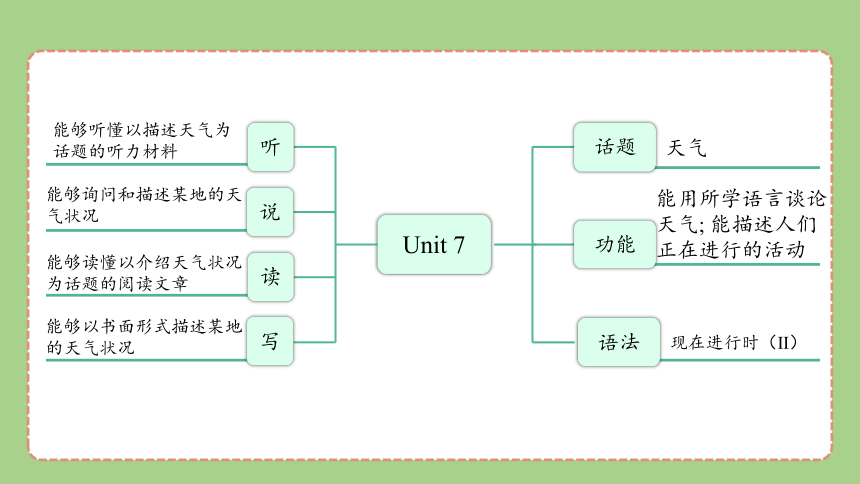
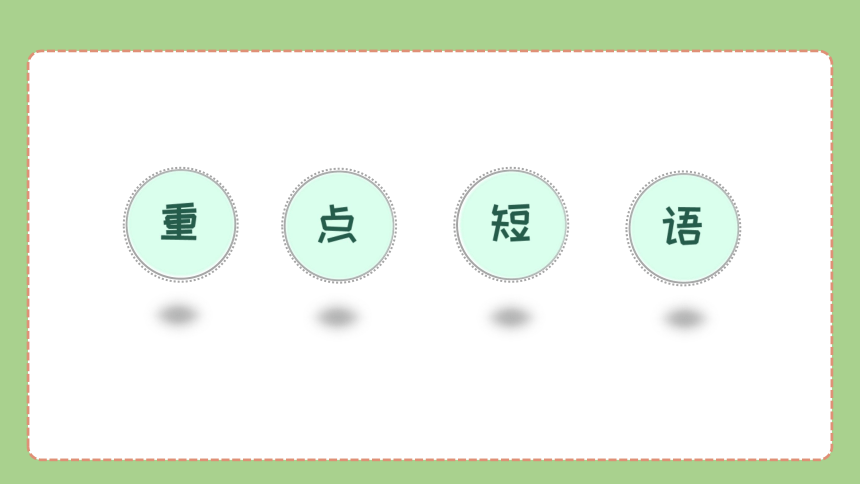
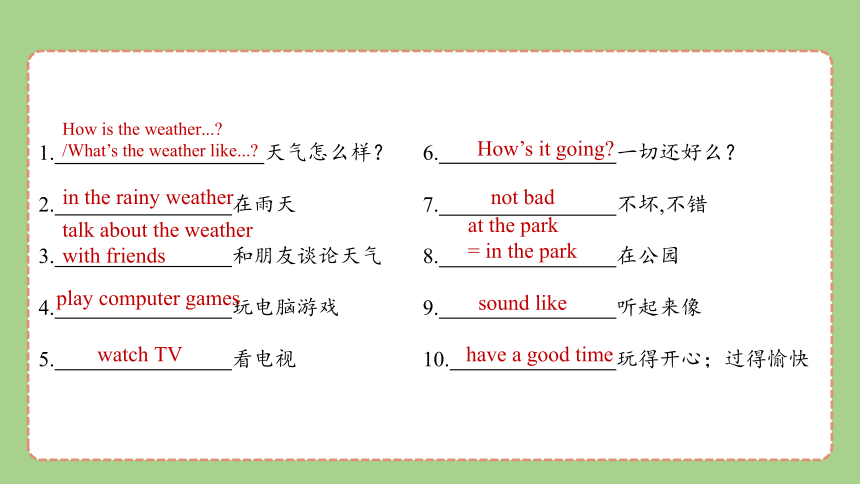
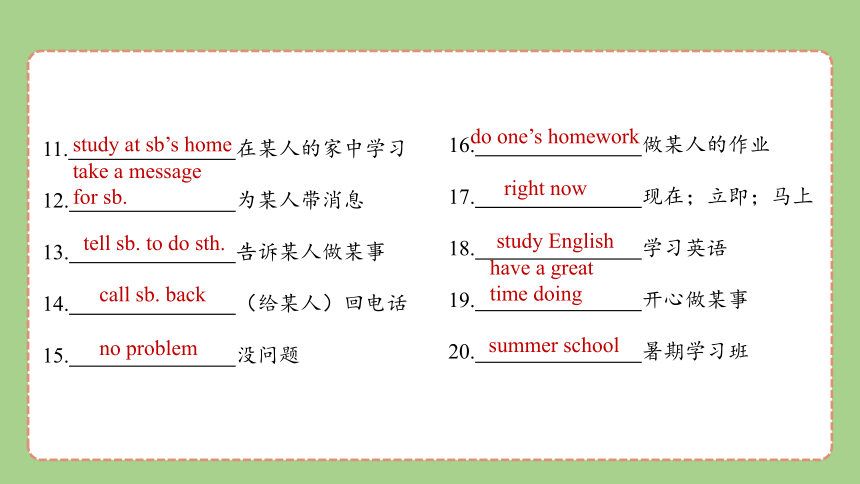
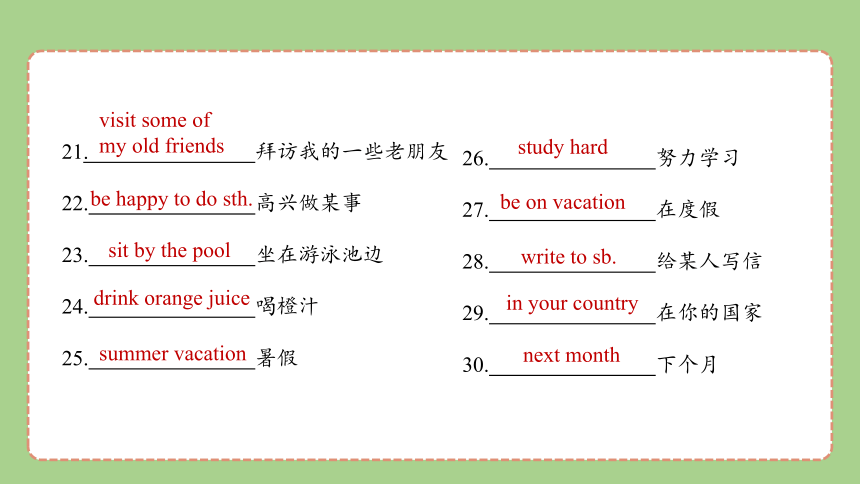
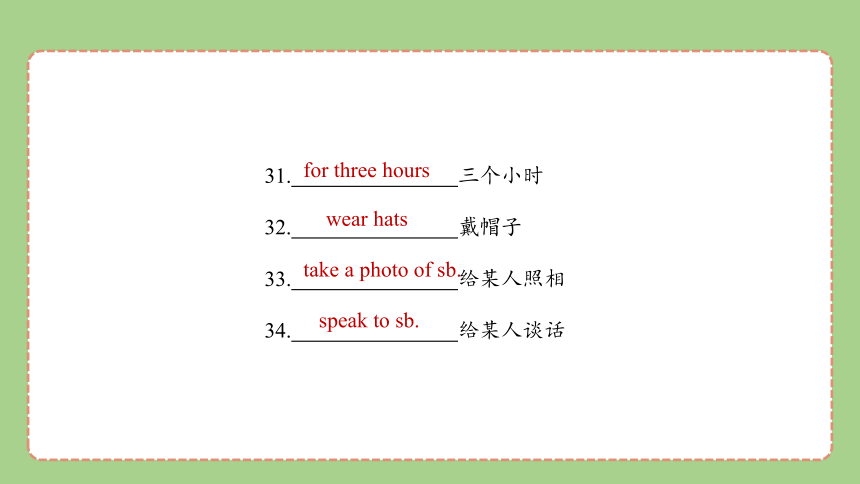
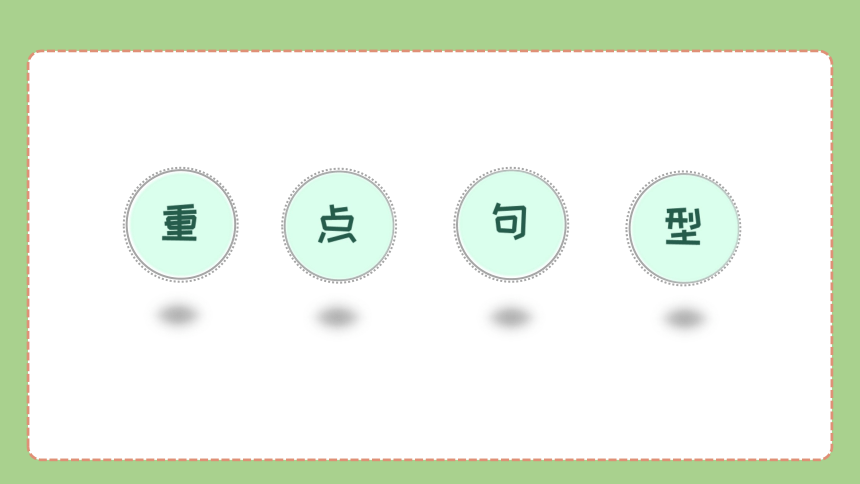
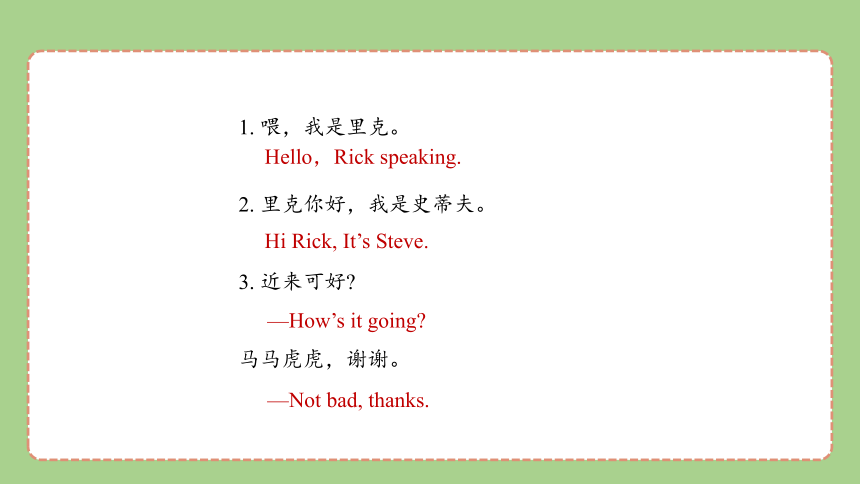
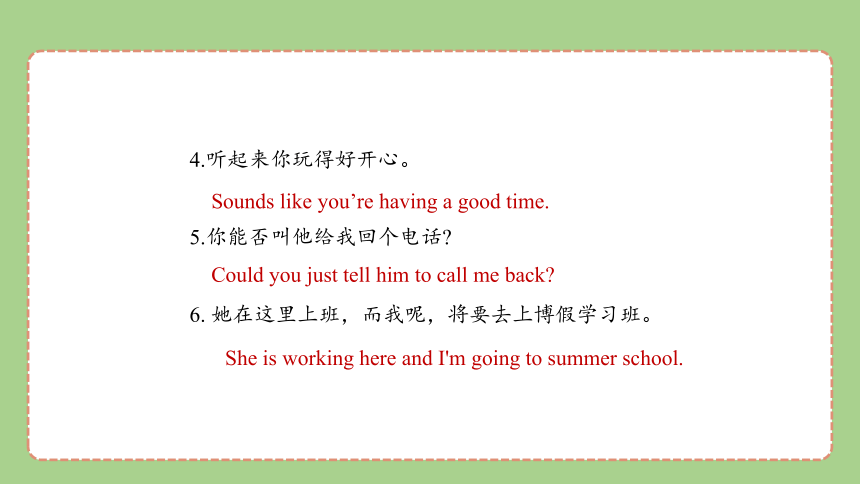
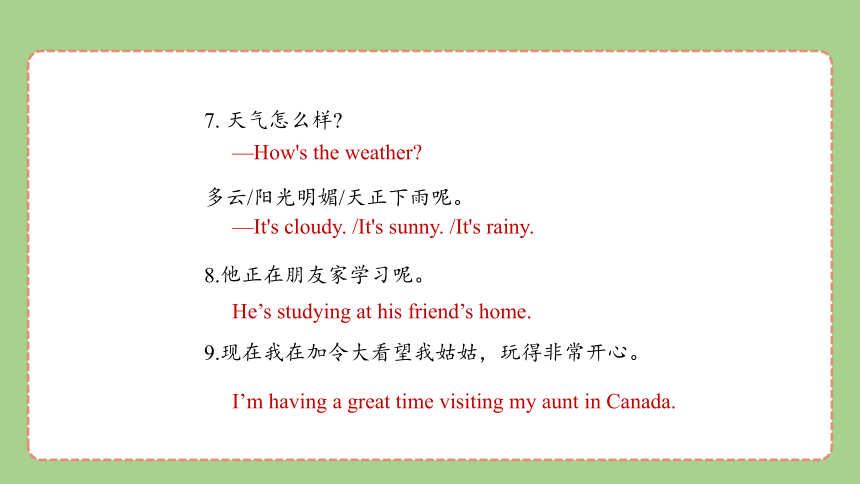
文档简介
(共44张PPT)
Unit
7
It's
raining!
复习课
现在进行时(Ⅱ)
能用所学语言谈论天气;
能描述人们正在进行的活动
天气
Unit
7
话题
功能
语法
听
说
读
写
能够听懂以描述天气为话题的听力材料
能够询问和描述某地的天气状况
能够读懂以介绍天气状况为话题的阅读文章
能够以书面形式描述某地的天气状况
1.
天气怎么样?
2.
在雨天
3.
和朋友谈论天气
4.
玩电脑游戏
5.
看电视
6.
一切还好么?
7.
不坏,不错
8.
在公园
9.
听起来像
10.
玩得开心;过得愉快
How
is
the
weather...?
/What’s
the
weather
like...?
in
the
rainy
weather
talk
about
the
weather
with
friends
play
computer
games
watch
TV
How’s
it
going?
not
bad
at
the
park
=
in
the
park
sound
like
have
a
good
time
11.
在某人的家中学习
12.
为某人带消息
13.
告诉某人做某事
14.
(给某人)回电话
15.
没问题
16.
做某人的作业
17.
现在;立即;马上
18.
学习英语
19.
开心做某事
20.
暑期学习班
study
at
sb’s
home
take
a
message
for
sb.
tell
sb.
to
do
sth.
call
sb.
back
no
problem
do
one’s
homework
right
now
study
English
have
a
great
time
doing
summer
school
21.
拜访我的一些老朋友
22.
高兴做某事
23.
坐在游泳池边
24.
喝橙汁
25.
暑假
26.
努力学习
27.
在度假
28.
给某人写信
29.
在你的国家
30.
下个月
visit
some
of
my
old
friends
be
happy
to
do
sth.
sit
by
the
pool
drink
orange
juice
summer
vacation
study
hard
be
on
vacation
write
to
sb.
in
your
country
next
month
31.
三个小时
32.
戴帽子
33.
给某人照相
34.
给某人谈话
for
three
hours
wear
hats
take
a
photo
of
sb.
speak
to
sb.
1.
喂,我是里克。
2.
里克你好,我是史蒂夫。
3.
近来可好?
马马虎虎,谢谢。
Hello,Rick
speaking.
Hi
Rick,
It’s
Steve.
—How’s
it
going?
—Not
bad,
thanks.
4.听起来你玩得好开心。
5.你能否叫他给我回个电话?
6.
她在这里上班,而我呢,将要去上博假学习班。
Sounds
like
you’re
having
a
good
time.
Could
you
just
tell
him
to
call
me
back?
She
is
working
here
and
I'm
going
to
summer
school.
7.
天气怎么样?
多云/阳光明媚/天正下雨呢。
8.他正在朋友家学习呢。
9.现在我在加令大看望我姑姑,玩得非常开心。
—How's
the
weather?
—It's
cloudy.
/It's
sunny.
/It's
rainy.
He’s
studying
at
his
friend’s
home.
I’m
having
a
great
time
visiting
my
aunt
in
Canada.
10.这儿的天气凉爽,正好适宜于散步。
11.
我正在学习英语且收获颇丰。
12.
暑假过得怎么样?
The
weather
here
is
cool
and
cloudy,just
right
for
walking.
I'm
studying
English
and
I'm
learning
a
lot.
How’s
your
summer
vacation
going?
rain
rain
作动词,意为“下雨,降雨”,短语rain
cats
and
dogs,意为“下倾盆大雨”。
e.g.
It
often
rains
in
summer.
【注意】表示下雨时,可以用rain的不同形式来表达。
e.g.
There
was
a
heavy
rain
during
the
night.
(rain作不可数名词,意为“雨”)
It
is
rainy
in
Beijing.
(rainy是rain的形容词形式,意为“下雨的”)
=
It
is
raining
in
Beijing.
(rain
作动词)
windy
windy是wind的形容词形式,意为“多风的”,是名词wind加y变来的形容词。英语中,许多表天气的名词后加y,可以变成相应的形容词。
e.g.
cloud(云)
+y→cloudy
多云的
sun
(太阳)
+
n
+y→sunny
(晴朗的)
rain(雨)
+
y→rainy(下雨的)
snow(雪)
+
y→snowy
(下雪的)
cook
cook作及物动词,意为“烹调”,其后可接三餐或具体的某种菜肴作宾语,也可作不及物动词。
e.g.
My
mother
cooks
breakfast
for
me
every
morning.
cook
作名词,意为“厨师”。
e.g.
His
uncle
is
a
good
cook.
cook
后加—er,构成cooker,是可数名词,意为“厨具”。
e.g.
There
are
all
kinds
of
cookers
in
the
supermarket.
message
message
意为“消息,信息”。take
a
message
意为“捎个口信”;leave
a
message
意为“留个口信”;send
a
message
意为“发送信息”。
e.g.
Can
I
take
a
message
for
him?
He
sent
a
message
to
me
yesterday.
back
back
副词,意为“回来”或者“回原处”。
call
sb.
back
意为“给某人回个电话”。
e.g.
I’ll
call
(you)
back.
1.back
还可以和其他一些动词一起构成短语动词,如:
be
back
(返回),come
back
(回来),
go
back
(回去),
get
back
(返回),
bring
back
(拿回来)等。
e.g.
It’s
September
now.
We
are
all
back
at
school.
back
2.back
作名词,意为“后背”,“后面”或“后部”。
e.g.
Do
you
know
the
little
boy
on
his
back?
3.back
作形容词,意为“后面的”。
There
is
a
picture
on
the
back
wall.
dry
1.dry作形容词,
意为“干燥的”,其反义词为“潮湿的”。e.g.
This
coat
will
keep
you
dry
in
the
rain.
2.dry
作动词,既可以作及物动词也可以作不及物动词,意为“使干燥,弄干,变干”。
e.g.
Don’t
cry!
Dry
your
eyes.
The
wet
clothes
will
soon
dry
in
the
sun.
cold&hot;
warm&cool
1.cold
寒冷的,冷的;
它的反义词是hot,意为“炎热的”;在句子中做定语或者表语;常用来描述天气。
e.g.
It’s
hot
today.
2.warm
意为“暖和的”,cool意为“凉爽的”;这是也是一组反义词,常用来描述天气;也常用来做定语或者表语。
e.g.
It’s
warm
in
spring
and
cool
in
autumn.
【注意】cool
还可以用形容词,还有“酷的,绝妙的”之意。用来赞美人、物或者事。
e.g.
He
looks
cool
in
his
new
T—shirt.
sit&seat
二者均可表示“坐”,sit是不及物动词,主语是人;seat是及物动词,主语是人时,表示“使……坐下”,宾语常是反身代词;主语是处所时,表示“能坐多少人”。
e.g.
She
sits
alone
in
her
room.
Our
classroom
can
seat
fifty
students.
vacation
vacation
意为“假期”,on
a
vacation
意为“度假”。
e.g.
In
summer,
we
often
go
to
the
mountains
on
a
vacation.
vacation&holiday辨析:
vacation
“假期”,指放下工作和学习的一段较长的休息时间,常可以用holiday替换;
holiday
“假日,休息日”主要指按风俗习惯或法律规定的纪念日或者休息日。在英式英语中,其复数形式可以表示延续一段时间的“假期”,美式英语则习惯用单数。
hard
hard副词,意为“努力地,辛苦地”,常放在动词后面修饰动词。
e.g.
They
are
studying
hard.
hard
还可以作形容词,意为“困难的,艰难的”时,与difficult同义,与easy相反;意为“硬的,牢固的”,与soft相对;hard还可以意为“严的,严厉的”。
e.g.
The
stone
is
hard.
Don’t
be
too
hard
on
her—she’s
very
young.
mountain&hill
mountain
指陡峭连绵的高山;
hill
指较低矮的小山或丘陵。
country
1.country
名词,意为“国,国家”。复数形式是countries。e.g.
This
is
a
beautiful
country.
2.country
作名词,还可以指“农村,乡下”,相当于countryside,
前面常用定冠词the。
e.g.
My
grandparents
live
in
the
country.
How’s
the
weather
in
Shanghai?
这是一个用来询问天气的句型,How’s是How
is的缩写形式。询问天气的句子还可以用What’s
the
weather
like?
/
What
do
you
think
of
the
weather?
来表示。在句末可以加上“介词+地点/时间/季节”短语。
e.g.
—What’s
the
weather
like
in
Beijing?
—It’s
cloudy.
—How’s
the
weather
here
in
summer?
—It’s
hot.
How’s
it
going?
这是一个由特殊疑问词how引导的表示问候的句子,也可以用:How
goes
it?
How
is
everything
going?
How
is
everything?来表示“询问对方的工作、学习和生活情况”。它们的意思是“一切都好吗?近来怎么样?”。
对于这个句子的回答要看具体的情况,可以回答:“Pretty
good!相当不错”,“Great!很好”,“Not
bad!还不错”,“Just
so—so.
马马虎虎”,“Terrible!太糟糕了!”。
Not
bad,
thanks.
Not
bad.
是口语中常用的表达,也可用作Not
so
bad.
/
Not
too
bad.
等,其主要用法有:
1.用来回答像
How
are
you?
这类询问身体健康情况的问候语,意为:不错;很好。
2.用来含蓄地表示
quite(very)good这一意义,意为:很好;不错;还好。
e.g.
—How
is
your
English?
—Not
bad.
tell
sb.
to
do
sth.
tell经常作及物动词,意为“讲述,告诉”,后常接双宾语,侧重把一件事情传达给别人。常用结构是tell
sb.
to
do
sth.
意为“告诉某人做某事”,其否定形式为tell
sb.
not
to
do
sth.,意为“告诉某人不要做某事”,tell
sb.
about
sth.
意为“告诉某人关于某事”。e.g.
My
mother
tells
me
to
get
up
early.
No
problem.
No
problem常用于口语中表示同意或愉快地回答请求,意为“没有问题,小事一桩”。常见的用法有以下几种:
1.用来回答感谢(主要用于美国英语中),意为“不用谢;别客气;没什么”。
e.g.
—Thank
you
very
much.
—No
problem.
2.用来回答道歉(主要用于美国英语中),意为“没关系;没什么”。
e.g.
—I’m
sorry
to
have
kept
you
waiting.
—No
problem.
3.用来表示有能力做某事,意为:没问题;不在话下。e.g.
—Can
you
make
a
kite?
—No
problem.
正确使用本单元学习的表示天气的词汇;正确使用现在进行时
主要描述人们在不同天气下正在做的事情,主要考查表示天气的词汇及现在进行时
谈论天气及人们正在做的事情
单元话题
话题
内容
写作技巧
假如你叫何静,你和你的家人正在度假。请你用英语写一封60词左右的电子邮件向你的好朋友Cindy介绍一下你们度假的情况。内容提示:
1.Where
are
you?
2.What's
the
weather
like?
3.What
are
you
doing
right
now?
4.What
are
your
family
doing?
5.Are
you
having
a
good
time?
表达个人的观点
分别描述自己及家人正在做的事情
说明自己在度假,介绍天气情况
布局谋篇
开篇点题
展开分述
结尾总述
Hi,
Cindy,
How's
it
going?
I
am
on
a
vacation
in
Sanya
with
my
family.
It's
sunny
and
hot
today.
My
brother
is
having
a
great
time
playing
volleyball
with
some
boys.
My
sister
is
playing
with
the
sand.
She's
making
a
city
with
the
sand.
What
are
my
parents
doing?
My
father
is
swimming
in
the
sea.
He's
good
at
swimming.
My
mother
is
sitting
under
the
umbrella
and
drinking
some
juice.
She's
really
relaxed.
What
about
me?
I'm
writing
to
you
right
now.
I
think
we
are
all
having
fun.
Please
write
to
me
soon.
Yours,
He
Jing
1.Mr.
Wang
is
coming
to
our
school.
I
can't
wait
to
see
____.
A.
her
B.
him
C.
it
D.
them
2.—Gina,
could
you
please
play
the
drums
at
the
art
festival?
—____.
I
can
only
play
the
guitar.
A.
I'm
afraid
I
can't
B.
Yes,
I
can
C.
Sure,
I'd
love
to
D.
Not
bad
3.—Hurry
up!
—One
moment.
I
____
my
e—mails
and
then
I'm
ready
to
go.
A.
read
B.
am
reading
C.
was
reading
D.
have
read
B
A
B
4.Doctors
tell
us
____
our
hands
before
and
after
every
meal.
A.
wash
B.
washed
C.
washing
D.
to
wash
5.Tom
hardly
eats
breakfast,
____?
A.
isn't
he
B.
is
he
C.
doesn't
he
D.
does
he
6.—Helen,
could
you
please
water
the
flowers
in
my
garden?
—____
They
are
so
lovely.
A.
That's
too
bad
B.
With
pleasure
C.
You're
welcome
D.
I'm
afraid
not
D
D
B
7.It's
9:00
in
the
morning
now.
The
students
from
Grade
Nine
____
an
important
exam.
A.
have
B.
had
C.
are
having
8.—____
fine
weather
it
is!
Shall
we
go
hiking
in
the
hills?
—Why
not?
A.
What
B.
What
a
C.
How
D.
How
a
C
A
9.____
nice
weather
it
is!
Let's
go
out
for
a
picnic.
A.
What
B.
How
C.
What
a
10.—Will
you
go
to
the
picnic
this
Saturday?
—I'd
like
to,
____
I'll
have
to
help
look
after
my
baby
sister.
A.
but
B.
or
C.
and
D.
so
A
A
11.—Could
you
please
help
me
wash
the
car,
Tony?
—____.
I'm,
studying
for
my
coming
English
test
now.
A.
That's
right
B.
I'm
sorry
C.
It
doesn't
matter
D.
Not
at
all
12.—He
didn't
go
to
school,
did
he?
—____,
though
he
had
a
stomachache.
A.
No,
he
didn't
B.
Yes,
he
didn't
C.
Yes,
he
did
D.
No,
he
did
B
C
Unit
7
It's
raining!
复习课
现在进行时(Ⅱ)
能用所学语言谈论天气;
能描述人们正在进行的活动
天气
Unit
7
话题
功能
语法
听
说
读
写
能够听懂以描述天气为话题的听力材料
能够询问和描述某地的天气状况
能够读懂以介绍天气状况为话题的阅读文章
能够以书面形式描述某地的天气状况
1.
天气怎么样?
2.
在雨天
3.
和朋友谈论天气
4.
玩电脑游戏
5.
看电视
6.
一切还好么?
7.
不坏,不错
8.
在公园
9.
听起来像
10.
玩得开心;过得愉快
How
is
the
weather...?
/What’s
the
weather
like...?
in
the
rainy
weather
talk
about
the
weather
with
friends
play
computer
games
watch
TV
How’s
it
going?
not
bad
at
the
park
=
in
the
park
sound
like
have
a
good
time
11.
在某人的家中学习
12.
为某人带消息
13.
告诉某人做某事
14.
(给某人)回电话
15.
没问题
16.
做某人的作业
17.
现在;立即;马上
18.
学习英语
19.
开心做某事
20.
暑期学习班
study
at
sb’s
home
take
a
message
for
sb.
tell
sb.
to
do
sth.
call
sb.
back
no
problem
do
one’s
homework
right
now
study
English
have
a
great
time
doing
summer
school
21.
拜访我的一些老朋友
22.
高兴做某事
23.
坐在游泳池边
24.
喝橙汁
25.
暑假
26.
努力学习
27.
在度假
28.
给某人写信
29.
在你的国家
30.
下个月
visit
some
of
my
old
friends
be
happy
to
do
sth.
sit
by
the
pool
drink
orange
juice
summer
vacation
study
hard
be
on
vacation
write
to
sb.
in
your
country
next
month
31.
三个小时
32.
戴帽子
33.
给某人照相
34.
给某人谈话
for
three
hours
wear
hats
take
a
photo
of
sb.
speak
to
sb.
1.
喂,我是里克。
2.
里克你好,我是史蒂夫。
3.
近来可好?
马马虎虎,谢谢。
Hello,Rick
speaking.
Hi
Rick,
It’s
Steve.
—How’s
it
going?
—Not
bad,
thanks.
4.听起来你玩得好开心。
5.你能否叫他给我回个电话?
6.
她在这里上班,而我呢,将要去上博假学习班。
Sounds
like
you’re
having
a
good
time.
Could
you
just
tell
him
to
call
me
back?
She
is
working
here
and
I'm
going
to
summer
school.
7.
天气怎么样?
多云/阳光明媚/天正下雨呢。
8.他正在朋友家学习呢。
9.现在我在加令大看望我姑姑,玩得非常开心。
—How's
the
weather?
—It's
cloudy.
/It's
sunny.
/It's
rainy.
He’s
studying
at
his
friend’s
home.
I’m
having
a
great
time
visiting
my
aunt
in
Canada.
10.这儿的天气凉爽,正好适宜于散步。
11.
我正在学习英语且收获颇丰。
12.
暑假过得怎么样?
The
weather
here
is
cool
and
cloudy,just
right
for
walking.
I'm
studying
English
and
I'm
learning
a
lot.
How’s
your
summer
vacation
going?
rain
rain
作动词,意为“下雨,降雨”,短语rain
cats
and
dogs,意为“下倾盆大雨”。
e.g.
It
often
rains
in
summer.
【注意】表示下雨时,可以用rain的不同形式来表达。
e.g.
There
was
a
heavy
rain
during
the
night.
(rain作不可数名词,意为“雨”)
It
is
rainy
in
Beijing.
(rainy是rain的形容词形式,意为“下雨的”)
=
It
is
raining
in
Beijing.
(rain
作动词)
windy
windy是wind的形容词形式,意为“多风的”,是名词wind加y变来的形容词。英语中,许多表天气的名词后加y,可以变成相应的形容词。
e.g.
cloud(云)
+y→cloudy
多云的
sun
(太阳)
+
n
+y→sunny
(晴朗的)
rain(雨)
+
y→rainy(下雨的)
snow(雪)
+
y→snowy
(下雪的)
cook
cook作及物动词,意为“烹调”,其后可接三餐或具体的某种菜肴作宾语,也可作不及物动词。
e.g.
My
mother
cooks
breakfast
for
me
every
morning.
cook
作名词,意为“厨师”。
e.g.
His
uncle
is
a
good
cook.
cook
后加—er,构成cooker,是可数名词,意为“厨具”。
e.g.
There
are
all
kinds
of
cookers
in
the
supermarket.
message
message
意为“消息,信息”。take
a
message
意为“捎个口信”;leave
a
message
意为“留个口信”;send
a
message
意为“发送信息”。
e.g.
Can
I
take
a
message
for
him?
He
sent
a
message
to
me
yesterday.
back
back
副词,意为“回来”或者“回原处”。
call
sb.
back
意为“给某人回个电话”。
e.g.
I’ll
call
(you)
back.
1.back
还可以和其他一些动词一起构成短语动词,如:
be
back
(返回),come
back
(回来),
go
back
(回去),
get
back
(返回),
bring
back
(拿回来)等。
e.g.
It’s
September
now.
We
are
all
back
at
school.
back
2.back
作名词,意为“后背”,“后面”或“后部”。
e.g.
Do
you
know
the
little
boy
on
his
back?
3.back
作形容词,意为“后面的”。
There
is
a
picture
on
the
back
wall.
dry
1.dry作形容词,
意为“干燥的”,其反义词为“潮湿的”。e.g.
This
coat
will
keep
you
dry
in
the
rain.
2.dry
作动词,既可以作及物动词也可以作不及物动词,意为“使干燥,弄干,变干”。
e.g.
Don’t
cry!
Dry
your
eyes.
The
wet
clothes
will
soon
dry
in
the
sun.
cold&hot;
warm&cool
1.cold
寒冷的,冷的;
它的反义词是hot,意为“炎热的”;在句子中做定语或者表语;常用来描述天气。
e.g.
It’s
hot
today.
2.warm
意为“暖和的”,cool意为“凉爽的”;这是也是一组反义词,常用来描述天气;也常用来做定语或者表语。
e.g.
It’s
warm
in
spring
and
cool
in
autumn.
【注意】cool
还可以用形容词,还有“酷的,绝妙的”之意。用来赞美人、物或者事。
e.g.
He
looks
cool
in
his
new
T—shirt.
sit&seat
二者均可表示“坐”,sit是不及物动词,主语是人;seat是及物动词,主语是人时,表示“使……坐下”,宾语常是反身代词;主语是处所时,表示“能坐多少人”。
e.g.
She
sits
alone
in
her
room.
Our
classroom
can
seat
fifty
students.
vacation
vacation
意为“假期”,on
a
vacation
意为“度假”。
e.g.
In
summer,
we
often
go
to
the
mountains
on
a
vacation.
vacation&holiday辨析:
vacation
“假期”,指放下工作和学习的一段较长的休息时间,常可以用holiday替换;
holiday
“假日,休息日”主要指按风俗习惯或法律规定的纪念日或者休息日。在英式英语中,其复数形式可以表示延续一段时间的“假期”,美式英语则习惯用单数。
hard
hard副词,意为“努力地,辛苦地”,常放在动词后面修饰动词。
e.g.
They
are
studying
hard.
hard
还可以作形容词,意为“困难的,艰难的”时,与difficult同义,与easy相反;意为“硬的,牢固的”,与soft相对;hard还可以意为“严的,严厉的”。
e.g.
The
stone
is
hard.
Don’t
be
too
hard
on
her—she’s
very
young.
mountain&hill
mountain
指陡峭连绵的高山;
hill
指较低矮的小山或丘陵。
country
1.country
名词,意为“国,国家”。复数形式是countries。e.g.
This
is
a
beautiful
country.
2.country
作名词,还可以指“农村,乡下”,相当于countryside,
前面常用定冠词the。
e.g.
My
grandparents
live
in
the
country.
How’s
the
weather
in
Shanghai?
这是一个用来询问天气的句型,How’s是How
is的缩写形式。询问天气的句子还可以用What’s
the
weather
like?
/
What
do
you
think
of
the
weather?
来表示。在句末可以加上“介词+地点/时间/季节”短语。
e.g.
—What’s
the
weather
like
in
Beijing?
—It’s
cloudy.
—How’s
the
weather
here
in
summer?
—It’s
hot.
How’s
it
going?
这是一个由特殊疑问词how引导的表示问候的句子,也可以用:How
goes
it?
How
is
everything
going?
How
is
everything?来表示“询问对方的工作、学习和生活情况”。它们的意思是“一切都好吗?近来怎么样?”。
对于这个句子的回答要看具体的情况,可以回答:“Pretty
good!相当不错”,“Great!很好”,“Not
bad!还不错”,“Just
so—so.
马马虎虎”,“Terrible!太糟糕了!”。
Not
bad,
thanks.
Not
bad.
是口语中常用的表达,也可用作Not
so
bad.
/
Not
too
bad.
等,其主要用法有:
1.用来回答像
How
are
you?
这类询问身体健康情况的问候语,意为:不错;很好。
2.用来含蓄地表示
quite(very)good这一意义,意为:很好;不错;还好。
e.g.
—How
is
your
English?
—Not
bad.
tell
sb.
to
do
sth.
tell经常作及物动词,意为“讲述,告诉”,后常接双宾语,侧重把一件事情传达给别人。常用结构是tell
sb.
to
do
sth.
意为“告诉某人做某事”,其否定形式为tell
sb.
not
to
do
sth.,意为“告诉某人不要做某事”,tell
sb.
about
sth.
意为“告诉某人关于某事”。e.g.
My
mother
tells
me
to
get
up
early.
No
problem.
No
problem常用于口语中表示同意或愉快地回答请求,意为“没有问题,小事一桩”。常见的用法有以下几种:
1.用来回答感谢(主要用于美国英语中),意为“不用谢;别客气;没什么”。
e.g.
—Thank
you
very
much.
—No
problem.
2.用来回答道歉(主要用于美国英语中),意为“没关系;没什么”。
e.g.
—I’m
sorry
to
have
kept
you
waiting.
—No
problem.
3.用来表示有能力做某事,意为:没问题;不在话下。e.g.
—Can
you
make
a
kite?
—No
problem.
正确使用本单元学习的表示天气的词汇;正确使用现在进行时
主要描述人们在不同天气下正在做的事情,主要考查表示天气的词汇及现在进行时
谈论天气及人们正在做的事情
单元话题
话题
内容
写作技巧
假如你叫何静,你和你的家人正在度假。请你用英语写一封60词左右的电子邮件向你的好朋友Cindy介绍一下你们度假的情况。内容提示:
1.Where
are
you?
2.What's
the
weather
like?
3.What
are
you
doing
right
now?
4.What
are
your
family
doing?
5.Are
you
having
a
good
time?
表达个人的观点
分别描述自己及家人正在做的事情
说明自己在度假,介绍天气情况
布局谋篇
开篇点题
展开分述
结尾总述
Hi,
Cindy,
How's
it
going?
I
am
on
a
vacation
in
Sanya
with
my
family.
It's
sunny
and
hot
today.
My
brother
is
having
a
great
time
playing
volleyball
with
some
boys.
My
sister
is
playing
with
the
sand.
She's
making
a
city
with
the
sand.
What
are
my
parents
doing?
My
father
is
swimming
in
the
sea.
He's
good
at
swimming.
My
mother
is
sitting
under
the
umbrella
and
drinking
some
juice.
She's
really
relaxed.
What
about
me?
I'm
writing
to
you
right
now.
I
think
we
are
all
having
fun.
Please
write
to
me
soon.
Yours,
He
Jing
1.Mr.
Wang
is
coming
to
our
school.
I
can't
wait
to
see
____.
A.
her
B.
him
C.
it
D.
them
2.—Gina,
could
you
please
play
the
drums
at
the
art
festival?
—____.
I
can
only
play
the
guitar.
A.
I'm
afraid
I
can't
B.
Yes,
I
can
C.
Sure,
I'd
love
to
D.
Not
bad
3.—Hurry
up!
—One
moment.
I
____
my
e—mails
and
then
I'm
ready
to
go.
A.
read
B.
am
reading
C.
was
reading
D.
have
read
B
A
B
4.Doctors
tell
us
____
our
hands
before
and
after
every
meal.
A.
wash
B.
washed
C.
washing
D.
to
wash
5.Tom
hardly
eats
breakfast,
____?
A.
isn't
he
B.
is
he
C.
doesn't
he
D.
does
he
6.—Helen,
could
you
please
water
the
flowers
in
my
garden?
—____
They
are
so
lovely.
A.
That's
too
bad
B.
With
pleasure
C.
You're
welcome
D.
I'm
afraid
not
D
D
B
7.It's
9:00
in
the
morning
now.
The
students
from
Grade
Nine
____
an
important
exam.
A.
have
B.
had
C.
are
having
8.—____
fine
weather
it
is!
Shall
we
go
hiking
in
the
hills?
—Why
not?
A.
What
B.
What
a
C.
How
D.
How
a
C
A
9.____
nice
weather
it
is!
Let's
go
out
for
a
picnic.
A.
What
B.
How
C.
What
a
10.—Will
you
go
to
the
picnic
this
Saturday?
—I'd
like
to,
____
I'll
have
to
help
look
after
my
baby
sister.
A.
but
B.
or
C.
and
D.
so
A
A
11.—Could
you
please
help
me
wash
the
car,
Tony?
—____.
I'm,
studying
for
my
coming
English
test
now.
A.
That's
right
B.
I'm
sorry
C.
It
doesn't
matter
D.
Not
at
all
12.—He
didn't
go
to
school,
did
he?
—____,
though
he
had
a
stomachache.
A.
No,
he
didn't
B.
Yes,
he
didn't
C.
Yes,
he
did
D.
No,
he
did
B
C
同课章节目录
- Unit 1 Can you play the guitar?
- Section A
- Section B
- Unit 2 What time do you go to school?
- Section A
- Section B
- Unit 3 How do you get to school?
- Section A
- Section B
- Unit 4 Don't eat in class.
- Section A
- Section B
- Unit 5 Why do you like pandas?
- Section A
- Section B
- Unit 6 I'm watching TV.
- Section A
- Section B
- Review of Units 1-6
- Unit 7 It's raining!
- Section A
- Section B
- Unit 8 Is there a post office near here?
- Section A
- Section B
- Unit 9 What does he look like?
- Section A
- Section B
- Unit 10 I'd like some noodles.
- Section A
- Section B
- Unit 11 How was your school trip?
- Section A
- Section B
- Unit 12 What did you do last weekend?
- Section A
- Section B
